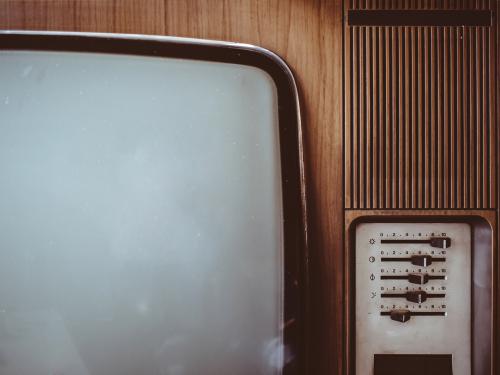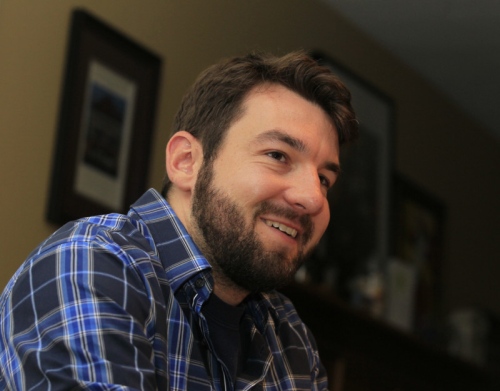
—December 15, 2011
1.
It began with a bang,
the first of many—the seismic cough
of a bunker-buster
in Baghdad. Yes,
the woman near Haifa Street said,
I was in shock; I was in awe.
Later: Babylon for sale
on eBay.
2.
That man in As-Sadiyah said
after Uday took
his sister, fucked her
for a long weekend,
she went home,
bathed in gasoline
in the family courtyard
and burned
on a spring afternoon.
He said Thank you,
and shook my hand. He said
Saddam,
and spat on the road.
3.
On television, I watch the End
of Mission Ceremony,
just as I also watched
the bunker-busters drop.
The war began
in my living room
and ended
in my living room,
but this time,
on a much larger television
with a perimeter
of surround sound.
4.
Also today on the newsstands:
Ms. Lohan’s shadow
of cleavage, her lips thick,
red like wax candy.
On Twitter, readers have complained
about the freckles
airbrushed from her shoulders
and chest. Hugh
Hefner says
the January/February issue
has eclipsed sales records.
5.
On CNN dot-com’s
Home and Away
Casualty List, a white dot
on a map of America
represents
a dead soldier: name, rank,
town of birth. Zoom out
and the dots blur
together like human lights
from space at night,
or a map to show
where the country’s suffered
a heavy downfall of snow.
6.
I don’t know how many
Iraqis are dead. I know there was
that blue van
our 113
Armored Personnel Carrier
collided with one night
on the dark sloping road
of Route Willow. The van
going 60; the APC, 35;
one headed west; the other,
east; the road
unlit, unmarked. The passengers:
dead with their blood
on the leather seats.
The front of the van—
a mangled web of steel.
The driver’s face flat
to the steering wheel
as if he’d been trying
to dive through it.
7.
It is difficult to say
my name to a girl
I’ve met at a loud bar;
it sounds too much
like Who or You.
Before Iraq I had
this problem, and after Iraq,
I still have this problem. When a girl
with black hair and silicone
breasts, whom I met
on my lap in a Las Vegas
gentlemen’s club, asked me
my name, I said it; she said, No,
you—your name. I gave her
the same simile I’d been using
my entire life: like Hugh
Hefner, which began
a conversation
about her time living
for three months
in the Playboy Mansion.
I told her I gave an Iraqi soldier
a Playboy for his black
Iraqi Army hat, a souvenir
I could take home (because I wanted
concrete reasons why
I was going home). Later in that hour,
she asked me
Should we be There? I only
sighed. She was wearing
a silk thong, her breasts were inches
from my nose, and she whispered,
looking down, So much
suffering. She sat there
on my lap for an hour. I didn’t
even purchase a dance.
8.
At the ceremony’s close,
two soldiers take down
the United States Forces-Iraq flag.
One holds the flag horizontal,
while the other
pulls on the Desert
Camouflage flag condom,
gently, respectfully,
like the careful taping
at Abu Ghraib
of a wire to a man’s scrotum.
They march away, carrying
the flag as the Army Band—
off-camera, unseen—
plays a patient low brass
while all of the soldiers
hold their salutes.
9.
Sometimes, I just want
to tell stories:
the girl who burned;
the 13 passengers dead;
the boy and his father
accidentally
shot; the 100-year-old
man who sobbed
and said when we invaded,
his son—locked in a cell
for 15 years—came home;
the raid where we knocked
over a stack of dishes—
they shattered
on the dirt floor
and the woman, already
screaming, refused to take
our money for the damage.
10.
In the velvet light of the club,
that woman’s hair shadowed
her lovely face; her teeth seemed
to glow fluorescent white. Soon,
she went to another
man across the bar,
her ass on his lap. Sometimes,
I still don’t know
what I was doing There. Sometimes,
I do. I know
we were there. They were there.
I am the man. I traded a Playboy
for a hat. Someone almost killed me
with a rocket buried
beneath bricks.
A dead man was kissing
a steering wheel. We broke
a woman’s handmade plates.
She wouldn’t even take our money.

